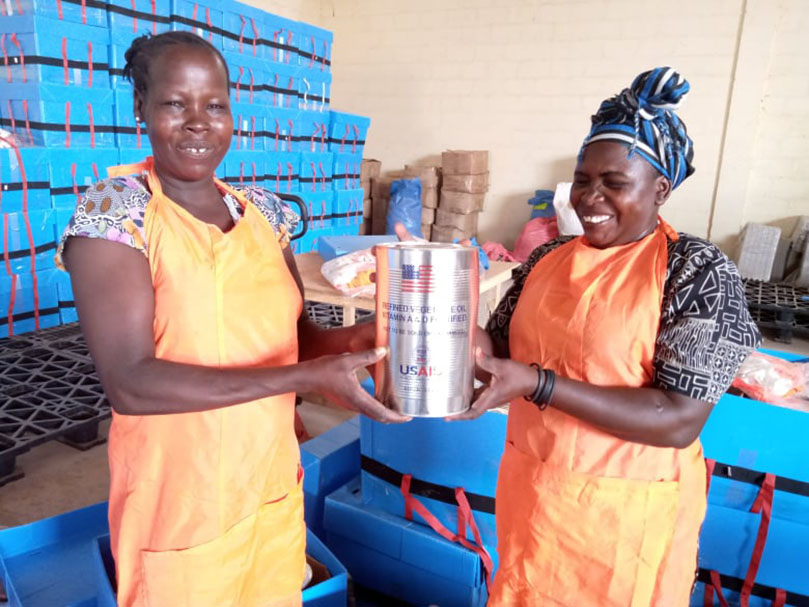
Harnessing Private Sector Innovation
Cooking oil was once thought of as “undroppable,” but with the help of USAID’s special oil canisters and SkyLIFE’s innovative engineering, we are now able to quickly deliver oil to even the most remote locations. In May 2015, bright blue boxes strapped to orange parachutes descended from the skies of Ganyiel, South Sudan, in response to a civil conflict that has left millions of people facing life-threatening hunger.
While humanitarian airdrops have been used for decades in South Sudan, they are used as a last resort because they are costly, require personnel to receive them, and can lead to inadvertent injuries.
But these airdrops and boxes were different from standard airdrops. They were smaller, lighter, and were dropped from an aircraft in precise scatter patterns. These boxes successfully delivered canned USAID vegetable oil, a cooking staple that typically didn’t survive drops and arrived damaged and unfit for use.
The humanitarian community continues to learn, grow, and adapt to provide more effective disaster responses and life-saving assistance, and we know that learning and adapting doesn’t happen in a vacuum. In addition to working with local communities and governments, United Nations partners, non-governmental organizations, and on-the-ground field teams, USAID focuses on innovation and the power of public-private partnerships to efficiently improve the way we deliver humanitarian assistance.
And we did just that when our partner, the UN World Food Programme (WFP) partnered with SkyLIFE Technology to pilot new materials to airdrop food assistance to areas of South Sudan.
So why drop cans of oil from the sky in South Sudan?
South Sudan is one of the world’s most food-insecure countries, where 6 million people — half the country’s population — face severe food insecurity. Due to limited infrastructure, access constraints, ongoing violence, and flooding, South Sudan poses special challenges to aid delivery and emergency assistance.
USAID’s humanitarian partners use a variety of delivery methods, including overland routes by road and truck, airplanes and helicopters, and when possible, barges on the Nile River and amphibious vehicles to deliver emergency assistance to areas that are remote and can be dangerous. USAID overcomes these challenges in the most difficult countries of all — countries like South Sudan — with the help and creativity of partner organizations such as WFP.
In South Sudan, WFP successfully and safely distributed USAID food assistance packages that weighed up to 55 pounds (24.9 kilograms) using SkyBOX, a product from SkyLIFE’s portfolio. The food packages consisted of a variety of non-perishable items, including fortified vegetable oil, which is essential to human nutrition as it provides fatty acids beneficial for growth and development, is important to local diets, and has an 18-month shelf life. By the end of 2019, USAID partner WFP, supported by SkyLIFE Technology, delivered:
– USAID canned cooking oil: 173,702 tins weighing 4 liters (3.7 kilograms)
– Success rate: 99% delivered undamaged
Problem-solving, creative thinking, and cutting-edge technology gave rise to SkyLIFE. While traditional forms of transportation can take days or weeks to deliver aid, SkyLIFE’s contact-less airdrop delivery system can deliver relief supplies to very remote locations considerably faster. In addition to SkyBOX, SkyLIFE recently introduced SkyPACK, an individual-sized pack that can carry up to 10 ounces of aid including food, liquid, and medicine.
While these airdrops can be an effective delivery method for the most remote locations, they are not intended to replace traditional forms of delivery and are generally used as a last resort when other safer, more cost-efficient, and effective means are unavailable.
SkyLIFE works with WFP out of warehouses in South Sudan and has field service programs in Ethiopia and Kenya. SkyLIFE employs and trains local staff to assemble the delivery system components (including boxes and parachutes) and fill the cooking oil payloads. Local staff are also taught to upcycle and recycle the materials from the boxes and the orange parachutes — some of which are turned into aprons for other uses.
According to CEO Jeffrey Potter, SkyLIFE was born out of the lessons learned during the Haiti earthquake.
“In the immediate aftermath of the 2010 Haitian earthquake, I was part of a handful of engineers in Ohio watching the disaster response play out on TV. And through that experience we became the founding members of SkyLIFE.” — Potter
The company was built on the maxim that people should never experience the extent of suffering that the Haitian people did, he said.
“Between us, we had many patents and extensive experience in the food packaging industry,” he said. “ Our commitment, experience, and passion yielded innovative products that solve common development challenges with big impact.”
While innovation in the fast-moving humanitarian space is often challenging, USAID continues to seek novel and creative ways to find solutions to global problems. With the power of public-private partnerships, we can focus on efficiency, speed, agility, sustainability, and other values, without losing sight of beneficiaries.






